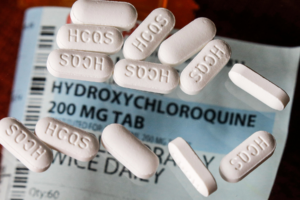Hydroxychloroquine is an antimalarial class of drug which is used in the treatment and prevention of acute attacks of malaria. It is also used to treat discoid or systemic lupus erythematosus, rheumatic disorders like rheumatoid arthritis, porphyria cutanea tarda and Q fever. Hydroxychloroquine acts by increasing pH within intracellular vacuoles and alter processes such as protein degradation by acidic hydrolases in the lysosome, assembly of macromolecules in the endosomes, and post translational modification of proteins in the Golgi apparatus.

Revoke of EUA for Hydroxychloroquine in COVID-19 treatment
Potential Benefit- Hydroxychloroquine in headlines for COVID-19 treatment
No medication therapies have demonstrated the efficacy to prevent the progression of COVID-19 to severe illness, but several medicines available in the market have been proposed as potential therapies. During time of March-2020, hydroxychloroquine and chloroquine are identified as potential medications for COVID-19 treatment.
In order to address this unmet emergency clinical need of global pandemic, on 28-Mar-2020, based on the available scientific data which determines that the anticipated benefit of antiviral activity is outweighing the listed safety concerns (potential risks) of hydroxychloroquine and chloroquine, US-FDA provided emergency use authorization (EUA) for hydroxychloroquine and chloroquine to treat Corona positive patients for whom a clinical trial is not available, or participation is not feasible. This EUA use is restricted to adults and adolescents (weight: >=50 kg) and for patients who are hospitalized with COVID-19.
Potential Risks- Severe Cardiotoxicity with Hydroxychloroquine use
On 13-Apr-2020, a priority Tracked Safety Issue (TSI) raised by the Division of Anti-infective products to assess the risk of cardiac toxicity with hydroxychloroquine and chloroquine with or without azithromycin when used for the treatment of COVID-19 caused by severe acute respiratory syndrome coronavirus 2 (SARS-CoV-2) infection. On 24-Apr-2020, US-FDA issued a Drug Safety Communication cautioning against the use of hydroxychloroquine or chloroquine for COVID-19 outside of the hospital setting or a clinical trial due to risk of abnormal heart rhythms like QT prolongation and ventricular tachycardia.
Evaluation of emerging safety data for hydroxychloroquine in context of EUA- The safety information from clinical trials, observational studies, and postmarketing surveillance data which were published or available after the EUA was included for review to assess the potential risks of the authorized use. This safety data review was initiated on 06-May-2020 by US-FDA’s Division of Antiviral department in consultation with the Office of Surveillance and Epidemiology (OSE).
The analysis of safety data from US-FDA’s Division of Pharmacovigilance (DPV) was focused on the available safety data associated with hydroxychloroquine or chloroquine use for the treatment or prevention of COVID-19.
During the review period of safety data, an emerging safety signal of methemoglobinemia with hydroxychloroquine in COVID-19 patients was identified by the FDA’s division of Applied Regulatory Science (DARS) and DPV. Many case reports were received of patients diagnosed with methemoglobinemia associated with the use of hydroxychloroquine amidst the COVID‐19 pandemic.
Review of Safety data analysis:
A total of 347 case reports-Individual Case Safety Reports (ICSRs) were received for hydroxychloroquine use and 38 case reports received for chloroquine use during the period of 01-Dec-2019 to 06-May-2020. Theses ICSRs were collected from FDA’s Adverse event reporting system (FAERS), from published literature (retrieved with relevant search strategy terms hydroxychloroquine & chloroquine), and from National Poison Data System (NPDS) database. The most commonly reported dose was 400 mg/day (43%) which is consistent with the FDA approved dose for labelled indications. Out of these ICSRs, number of fatal cases (death reports) for hydroxychloroquine and chloroquine are 77 & 10, respectively.
Serious adverse events attributed to hydroxychloroquine and chloroquine: The total number of serious adverse events (SAE) attributed directly (possibly/probably) to hydroxychloroquine and chloroquine use are 211. Out of 211 SAEs, QT prolongation (73%) is the most commonly reported SAE followed by ventricular arrythmia and Torsades de Pointes (TdP). In 92 cases, there was concomitant use of other medications which has potential to prolong QT interval (azithromycin is most common concomitant medication). 25 cases were identified with fatal outcome attributed to hydroxychloroquine and chloroquine.
Serious Listed safety concerns: Elevated liver enzymes, hepatitis and hyperbilirubinemia are the most commonly reported labelled non-cardiac serious adverse events (59%).
Serious Unlisted Safety concerns: Acute kidney injury and renal failure are the most commonly reported unlabeled non-cardiac serious adverse events (5%), followed by methemoglobinemia (4%), with two fatal methemoglobinemia cases.
Revoke of Emergency Use Authorization (EUA)
On 15-Jun-2020, USFDA, revoked the EUA for hydroxychloroquine and chloroquine owing to negative benefit risk profile in the context of COVID-19 treatment. This FDA’s decision is based on the below fact table that Potential anticipated benefit (Anti-viral activity) is not outweighing the potential risks (emerging safety issues and listed cardiac SAEs).
| Anticipated benefits | Potential Risks |
| Antiviral Activity | Expected Serious Safety concerns |
| Speeding Recovery of COVID-19 patients. Reducing Death Rate. Reducing Length of Hospitalization. Reducing the need for mechanical ventilation |
Cardiac toxicity-80 cases (73%) reported QT prolongation, 4 cases (4%) reported Torsades de Pointes, 14 cases (13%) reported ventricular arrhythmia, ventricular tachycardia, or ventricular fibrillation, and 25 cases (23%) reported fatal outcome. |
| Large randomized controlled clinical trial data showed no evidence of benefit (antiviral activity) for mortality or other outcomes from COVID-19 patients. |
Unexpected Safety concerns (Emerging safety Issues identified during EUA) |
| Acute kidney injury and renal failure, methemoglobinemia (2 fatal cases) |
Advice to health care professionals and Public:
In this COVID-19 Pandemic, Health care professionals treating corona positive patients and patients under COVID-19 treatment are advised to voluntarily report adverse drug experiences associated with the treatment medications (both approved and unapproved medicines using under EUA/compassionate programmes) to their respective national spontaneous adverse drug reaction (ADR) reporting system. (For guidelines and channels of ADR reporting, please refer to the country specific health authority websites).